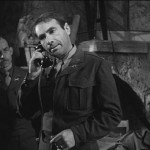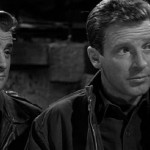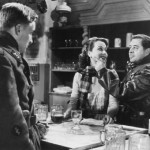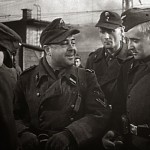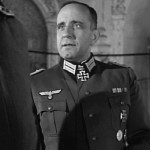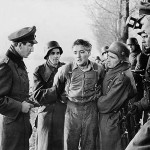
Decision Before Dawn – 1951
Once again, we are treated to a WWII war film. This one is directed by Anatole Litvak. It boasted no big names, though it was well cast, and adequately acted. It had a unique perspective on a little known aspect of the war, and because of that, it held my interest. But though it was enjoyable enough, it was nothing to write home about.
Oskar Werner played the leading role of Karl Maurer, codenamed “Happy.” He was a German POW near the end of the war. At that time, POWs were apparently recruited by the Americans as spies against their own people. Those who accepted were, of course, reviled by their own countrymen who remained loyal to the Reich, and labeled as traitors.
But Karl was an idealist who believed that his treasonous acts would ultimately bring a swifter end to the war, a war he never really believed in to begin with. He is sent back into Germany and charged with learning the location of the 11th Panzer Corps, and then returning that information to the Allied forces. If successful, he would save the lives of many Americans.
Werner did a fine job, but sometimes he seemed to lack energy. His performance was pretty low-key, which isn’t always a bad thing. I just think he could have raised the intensity level a little every so often. Fortunately, he had one thing that was absolutely essential for the character. He had a look of innocence about him that was undeniable. It went a long way to cementing the motives of the character.
Other notable actors in the film were Hans Christian Blech as Sergeant Barth, codenamed “Tiger.” He was another POW turned spy, though his reasons were completely different than Maurer’s. He was a man who would fight for whichever side was winning. I thought he actually played his part with a little more depth and strength than his fellow spy.
On the Allied side, Gary Merrill played the part of Colonel Devlin. When I first saw him on the screen, I though he had just walked in off the set of the 1949 nominee, Twelve O’clock High. But he didn’t really have much screen time. Instead, Richard Baseheart played the part of Lieutenant Dick Rennick. He was the American officer on assignment along with the two German spies. And finally, we have two ladies rounding out the cast. Dominique Blanchar as Monique, a French woman who had the task of training the spies before they went out on assignment, and Hildegard Knef as Hilde, a broken and depressed German woman who Maurer encounters.
But the actor that really stood out to me as just a bit better than the rest was Wilfred Seyferth. He played the part of a German courier who helps Maurer until he suspects him of being a spy. Then he does what he can to get him captured. He was loyal to the Reich and though he did his job with a smile, you could tell that he was angry and bitter about the fact that Germany was about to lose the war. His volatile explosion during a calm conversation hinted at the dangerous personality that lurked beneath the happy-go-lucky surface.
The film really delved into Maurer’s motives and his reflections on the attitudes of the German people he encountered. He ran into both civilians and military personnel, both people he know and people who knew him. And Litvak really got us into his head. Whenever Maurer had a moment alone to reflect, the dialogue of the people he had met that day could be heard as telling phrases rolled through his mind. It really painted a clear picture of how different people felt about the war from the German perspective.
We sometimes tend to forget that it was the Nazis who waged the war, not necessarily the Germans. By that, I mean that all Nazis were German, but not all Germans were Nazis. Either way, civilian and military, alike, were all affected by the terrible conflict. They all suffered and unfortunately, they were all blamed. But I suppose that might have been one of the points that the film was trying to make. There were some good German men who had no choice but to take part in the war. Maurer was one of them, and his noble yet tragic fate was proof.
The end of the film was poignant and meaningful. Not only does Maurer refuse to betray his new Allied allegiances, he makes the ultimate sacrifice to keep them. He gives his life so that the mission would be accomplished. He is captured and executed by his countrymen as a deserter.
Over all, I liked the film, but I just think that there could have been more suspense and more intensity. It certainly had drama and even a bit of action, but for this nominee, I don’t think that was enough. I would have liked to see more personal conflict or turmoil within Maurer. Maybe a little guilt at being a traitor to his native country would have given him a deeper dramatic arc. But the film concentrated on his reactions to others, not on his reactions to himself and his own actions.


